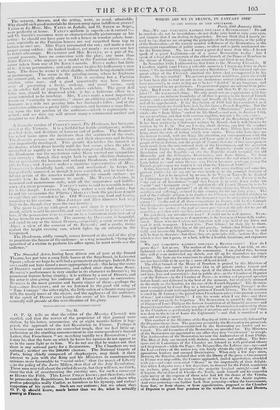drienatic version of COOPER'S novel, The Beadsman, has been pro-
dread at the Victoria. It is a faithful but feeble abridgment ; written in a b ol style, and destitute of humour and of pathos. The dramatirt has relied more upon the incidents than the sentiment of the story. The dr“hadis persona are numerous, and their characters and feelings very imperfectly developed. This greatly diminishes the interest of the drama ; which drags heavily until the last scene, %Olen the plot is unravelled as rapidly as it was tediously complicated before. Neither the 11ead,:men nor the mysterious sailor Maso excited our sympathies very strieTly ; though they might both be made effective characters. SELIN 1 iisumacs the humane and unhappy I leadsman, with consider- able fer.ling ; and A anorr makes a vigorous representative of Misr,. In ti: is dreadfully hard, cold, and moll:mica] : he keeps his face perfectly unmoved, as though it were varnished, and he were fear- ful any action of the muscles would destroy its smooth surface : we wonder bow he finds courage to speak. Mr. WN NNE &Plaints, in nwasored and monotonous style, with all the importance and indiffe- rence ora great personage. FARLEY's voice is said to resemble batter his is like dough. LATHAM, as Pippo, makes a very dull jester ; but de and his companion the Pilgrim ( Moltaur look the precioua c,mple
of they are intended to be. Old W11.1.1aSis was loud and hearty, according to his custom. Miss JARMAN and Miss lIouToN had ve..v little to dip, though they were the two heroini.a.
'rile piece is got up with great care ; and there is a pageant intro- duced, which would be graceful, and not insienificant in ladle el num- bers, if the procession were to come DB in it :minimums train instead of being brought on piecemeal. The scenery, by I I o.taann, is beautiful, and equal to any at the Great Ilouses,—especially a now scene in the Alps ; a view of the convent of St. liernard ; and a castle, risiug against the bright evening sun, which lights up an attherge in the foreground. The Ileadaman, oddly enough, comes forward at the end of the play to propitiate the favour of the audience : as a wag remarked, " being dis. appointed of a victim to perform his office upon, he must needs axe the audience."


















 Previous page
Previous page